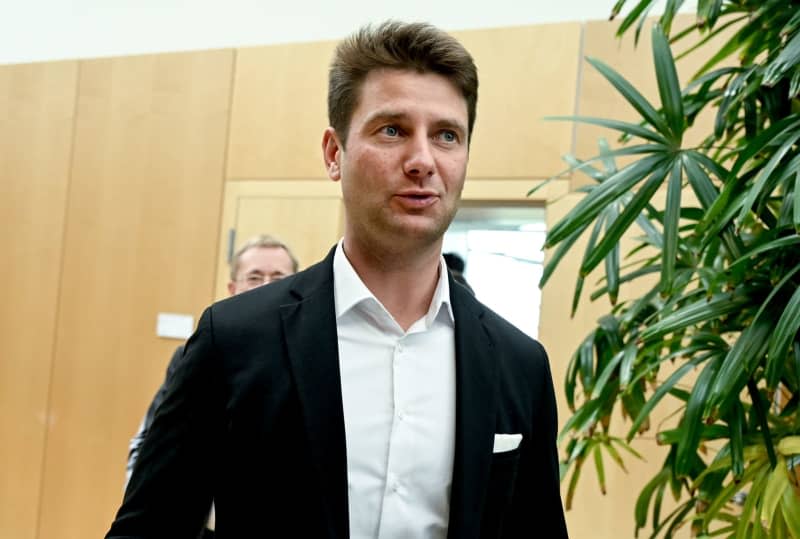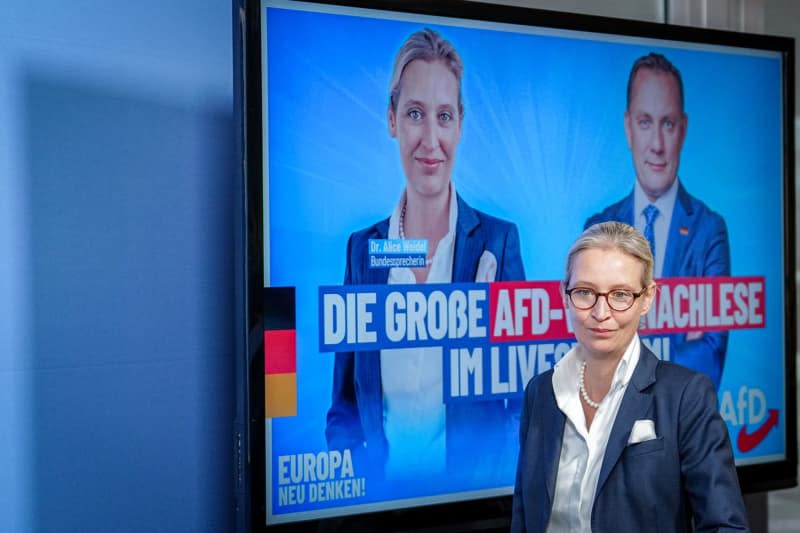The far-right AfD’s second-place finish in European Parliament elections has underscored the party’s growing strength and claim on power, the Alternative for Germany’s co-leader said on Monday.
Other German political parties have refused to form coalitions with the AfD or cooperate with the far-right populists in government bodies, effectively freezing the party out of power.
“We were already popping the corks yesterday,” AfD co-chairwoman Alice Weidel told journalists in Berlin at the AfD’s election review. “People want us to take on government responsibility.”
Weidel argued that the party’s increased support, particularly in eastern Germany, meant they couldn’t be kept out of government forever. Three eastern German states are due to hold elections in September, and the AfD ran a clear first place in the region in the European Parliament vote.
“We have the right to govern,” she said. “If you look at the results in Saxony, then you know who will be the next state premier.”
She also demanded that German Chancellor Olaf Scholz call early elections, given the poor showing by all three parties in his coalition.
AfD lawmakers boot Krah from faction
The AfD candidates freshly elected to the European Parliament voted on Monday to exclude Maximilian Krah – who had been the party’s top candidate in the election campaign – from the party’s delegation in the European Parliament.
The party had banned Krah from campaigning by the party in the run-up to the vote after Krah found himself at the centre of several scandals.
Excluding Krah from the AfD delegation may be part of an effort to patch things up with other far-right parties in the European Parliament that form the ID bloc, including French politician Marine Le Pen’s right-wing populist National Rally.
Krah is facing a criminal investigation into allegations that he may have accepted cash from Russia and China. A former top aide to Krah was separately arrested on allegations of having spied for China.
Krah also made highly controversial remarks to an Italian newspaper in which he said that members of the notorious Nazi SS paramilitary were not all criminals. Those remarks caused outrage, including among far-right politicians in other European countries.
In response to Krah’s comments, the ID bloc expelled the AfD from their faction in the European Parliament.
Krah is still expected to take a seat in the European Parliament, and is still a member of the AfD, but will be excluded from the AfD delegation. The party’s newly elected lawmakers voted eight to four to kick him out, with three abstaining.
Krah, however, remained self-confident after his expulsion on Monday and called the move a strategic mistake by the AfD, and suggested it might not sit well with local party groups and voters in eastern Germany.
Bystron kept in after denying charges
Unlike Krah, the AfD’s number two candidate on the election list, Petr Bystron, will be part of the AfD’s delegation in Brussels despite also facing allegations of foreign influence.
Bystron has been linked to a pro-Russian propaganda outlet and, according to a Czech newspaper report, was allegedly captured on audio recordings accepting cash from sources with Kremlin ties.
Bystron strenuously denied the accusations and, according to AfD co-chairman Tino Chrupalla, he gave a sworn statement to his new colleagues on Monday that he had not accepted money and that the allegations against him are all false.
Gains among young voters
AfD co-chairman Tino Chrupalla expressed his delight on Monday over exit polls showing the party making significant gains among young people.
The AfD won an estimated 16% among 16- to 24-year-old voters in Germany, a full 11 percentage points more than during the last European Parliament elections in 2019.
Chrupalla said young people had “used their heads to think” and were “no longer influenced” by public media, a long-time foil of the AfD.
He also claimed that young voters felt that the AfD was “not being treated fairly” and was being “marginalized.”
Germany allowed people as young as 16 to vote in the European Parliament elections for the first time this year.
Chrupalla claimed that lowering of the voting age was a “trick by the green populists,” but contended that it likely “backfired” and benefited his party instead.
In addition to the scandals around Krah and Bystron, the AfD was also the subject of weeks of anti-right wing mass protests across Germany after news reports revealed that AfD politicians attended a meeting along with far-right extremists to discuss plans to push immigrants out of the country.
But the party apparently weathered the negative headlines to gain ground in the vote, placing second among German voters with 15.9% of the vote and claiming 15 seats.





